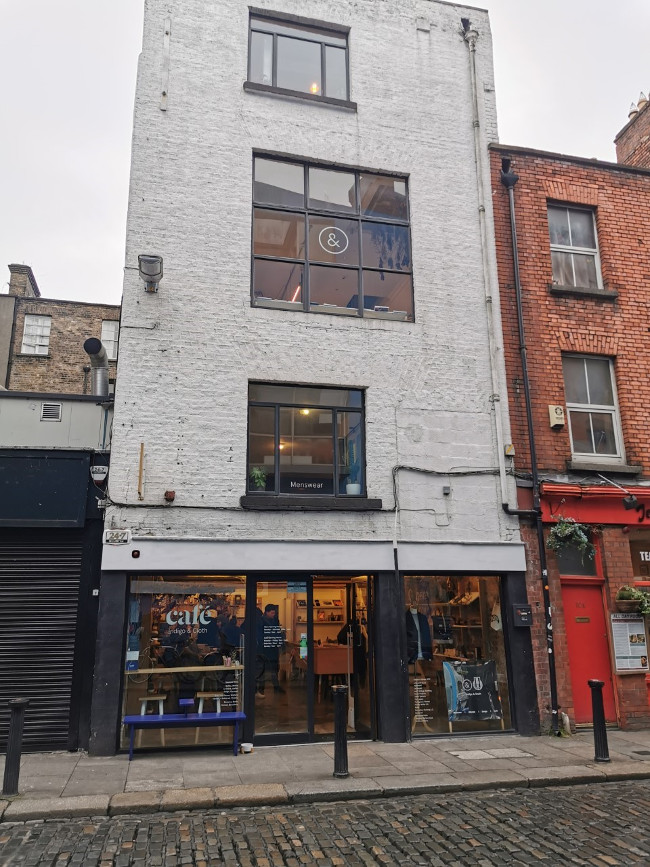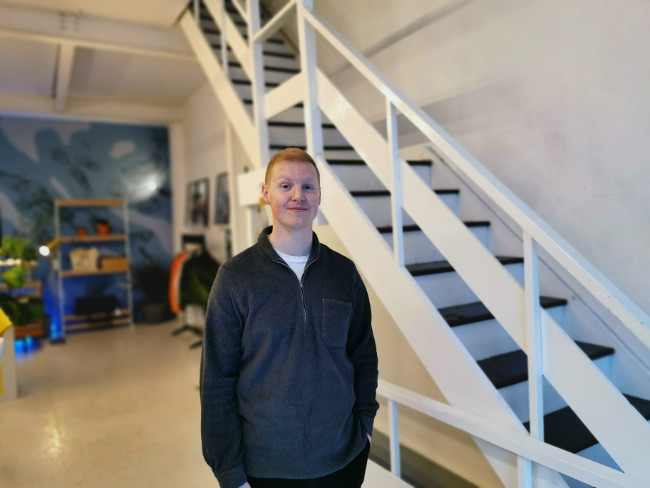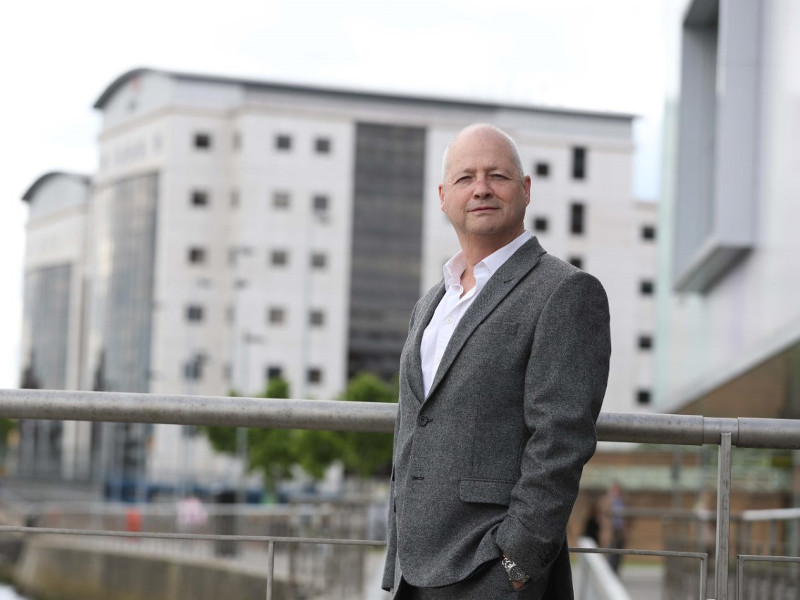The future of retail is about experiences. And when it comes to designer experiences, Andy Collins’ Indigo & Cloth in Temple Bar shows how layering good coffee with online and offline retail strategies complement each other nicely.
Sauntering down Essex Street in Temple Bar, your eyes are drawn to an interesting combination: on one side of the door of a narrow building sits a discreetly tucked away coffee shop and on the other window stands a mannequin sporting what could best be described as the latest in men’s fashion style.
In a moment it’s as if your senses have been assailed by Pinterest, before you realise how natural and welcoming it all seems. Welcome to Indigo & Cloth.
“It could just mean that you’re here for a conversation. You’re here to enjoy a coffee, read a magazine. It’s a safe haven where you know you can relax and feel comfortable”
As owner Andy Collins explains it, Indigo & Cloth is an independent menswear store that sources international and local fashion brands. It also doubles as a café and sometimes it is a graphic design/photography studio.
On the ground floor a barista toils away while soothing tunes take your mind out of the bustle outside, above on the next three floors above the latest in men’s fashion from Europe, the US and elsewhere adorn tastefully decorated rooms. The vibe is community combined with privacy. At the same time the business has its own online store and blog.
The coffee comes from suppliers like La Cabra in Aarhus, Bailies in Belfast and Nomad in Barcelona while the menswear and accessories come from providers ranging from Portuguese Flannel, Levi’s Vintage Clothing, Norse Projects, Stepney Workers Club and Schnayderman’s, to name a few.
Joining the dots between e-commerce and bricks and mortar
At a time when men everywhere have never been more conscious of their appearance, more versed in brands and styles but crave knowledge, guidance and discretion thanks to digital platforms like Instagram and Pinterest, Indigo & Cloth is fashioning what could be the future shape of retail. This is a world where connection matters, both offline and online.
“The the business would have opened in 2007, just before the recession hit and it was started off by a guy called Gareth Pitcher,” Collins explained. “He would have founded the business and set it up as an independent menswear store carrying brands that were exclusive to Dublin and the country and to really try and do something different in kind of opposition to the department stores and everything that was currently available in the city at that time.”
The business expanded before moving to Temple Bar along with a small café and graphic design studio.
“I actually first came into contact with the business as a fan, and I would have been a fan of some of the brands at the store. So when the opportunity came for me when I was kind of finishing college and had good kind of management experience under my belt, I joined the business as kind of menswear manager and buyer. The long story short, I bought the business from the previous owner, about a year and a half ago.
Collins agrees that Indigo & Cloth isn’t just about selling fashion, it is about an experience for loyal customers who have formed a connection with it.
“That’s what we’re predominantly known for. What we’re trying to really push is more towards experiential retailing. The brands that we stock and the products that we will have in-store are available online and places that maybe if you’re outside the city of Dublin, they may even get to you quicker. But the thing that makes us unique is the fact that we’re building this experience that’s so different as a brick and mortar space, than you find in department stores or other independents around the country.”
Collins agrees that men’s knowledge and instinct for fashion has evolved. People are also into sustainability and don’t want fast fashion but instead want to buy items that will stand the test of time.
“I think there’s a sense of permanence about most of the brands that we stock. So we try and stay away from things like trends. Obviously, a lot of our brands that we stock will go into certain trends. And for different seasons, they’ll be different product categories that you do catch on to, but really what we’re trying to provide to customers shopping with us is an investment in products that are built to last.”
“Irish customers also want sense of transparency about products. What we’re trying to do is build a trust with the community; people that obviously have shopped with us over the years, but that there’s that guarantee that it’s built a bit better than what you’re going to find on the high street. And really, you’re saving money then in the long run because you’re buying less, trying to focus on more permanent pieces in your collection, that you don’t necessarily have to go out every single season and spend so much.”
Experiential retailing Collins believes, is the future in a world where everything and anything can be bought online anyway. It makes sense to be different.
“I think with community in mind, it’s having that safe space that we’re trying to provide in the middle of the city where you feel comfortable to come in. It doesn’t necessarily mean you have to be purchasing products. It could just mean that you’re here for a conversation. You’re here to enjoy a coffee, read a magazine. It’s a safe haven where you know you can relax and feel comfortable.”
Toast the tastemaker
Another aspect is being a kind of tastemaker, evolving customers’ knowledge of brands but also creating that physical connection with brands they know from around the world but also locally from Ireland too.
“The fun part of our job is we kind of we source internationally, we have brands all the way from Japan to New York to as as close as London, some Irish brands as well. It doesn’t really make a difference geographically where they’re from, all we’re trying to do is find and source for our customers products that are made really well that have a kind of permanent quality about them that aren’t going to go out of style. They’re going to stay within fashion and be practical options for people to wear.”
Indigo & Cloth is also a showcase for Irish brands. “A lot of the craft focus brands we have at the moment is with tweed products, which are like scarves, blankets; we’ve more in textiles.
“This country is regarded as this haven for fabric and textile manufacturing. And we’re thinking now of projects where we can help that maybe go back to that historic sense of finding everything and building everything in this country, but maybe modernize it and bring a contemporary feel to it. So, it’s a project that we’ve actually just started and will hopefully release by the winter of this year.”
Collins believes retailers need to embrace digital and online as allies, not as threats.
“Online for us is its feasibility. Now you shop with your smartphone almost more so than physically in a bricks and mortar space. So that brings it kind of marries those two things. And it’s why the online part of our business is so important. You’re able to kind of educate yourself on our product categories on what we stock, while then in-store experiences are based on you know, the physical aspect of trying on a product and getting the feel of it, you know, whatever texture it is, or whatever it’s made from.
“So, it’s really, really important. We relaunched our website in October last year. And our core focus with launching the website was trying to replicate the experience of what we have in store it to make sure you get that sense when you’re shopping with us online.
“The coffee aspect of our business is replicated what we do with menswear, a speciality cafe where you’ll have great coffee but also maybe a unique product selection.”
Crucially, what Indigo & Cloth is about is offering a different experience to the high street or online stores.
“As an independent retailer we’re not going to have the digital budgets other online retailers would have. For the moment it is to try and really offer up something that’s more unique and build a culture around the business first and foremost. Because that’s why people will stay loyal to us.”
Written by John Kennedy (john.kennedy3@boi.com)
Published: 16 March, 2020








